Abstract
Drinking a concentrated glucose solution less than 1 h before the start of prolonged submaximal exercise has been reported to reduce endurance capacity during cycling. The purpose of this study was to re-examine the influence of pre-exercise ingestion of a concentrated glucose solution on endurance running capacity. Nine recreational runners (five men and four women) ran to exhaustion on a level treadmill, at speeds equivalent to 70% VO2max, on two occasions separated by at least 1 week. The runners ingested either a solution containing 75 g of glucose in 300 ml of water (G trial), or 300 ml of sweetened water (P trial) 30 min before each trial. As a consequence, the blood glucose concentrations were 55% higher at the beginning of the G trial compared with those recorded for the P trial (G trial, mean(s.e.) blood glucose = 6.3(0.7) mmol l-1 versus P trial, mean(s.e.) blood glucose = 4.1(0.3) mmol l-1; P < 0.01). Nevertheless, there were no differences in the running times to exhaustion between the two trials (G trial, mean(s.e.) 133.79(11.0) min versus P trial, mean(s.e.) 121.16(8.1) min). The results of this study show that ingesting a 25% glucose solution 30 min before exercise does not reduce the endurance capacity of recreational runners when the exercise intensity is equivalent to 70% VO2max.
Full text
PDF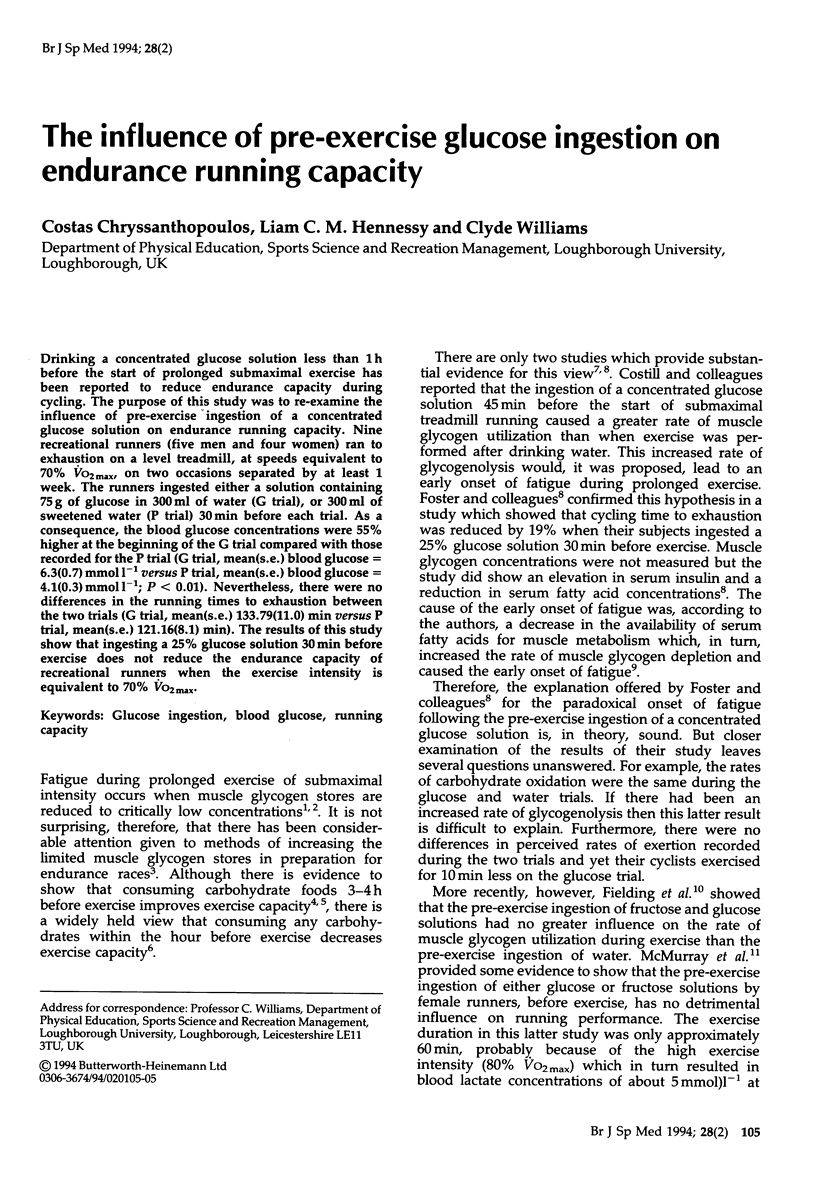
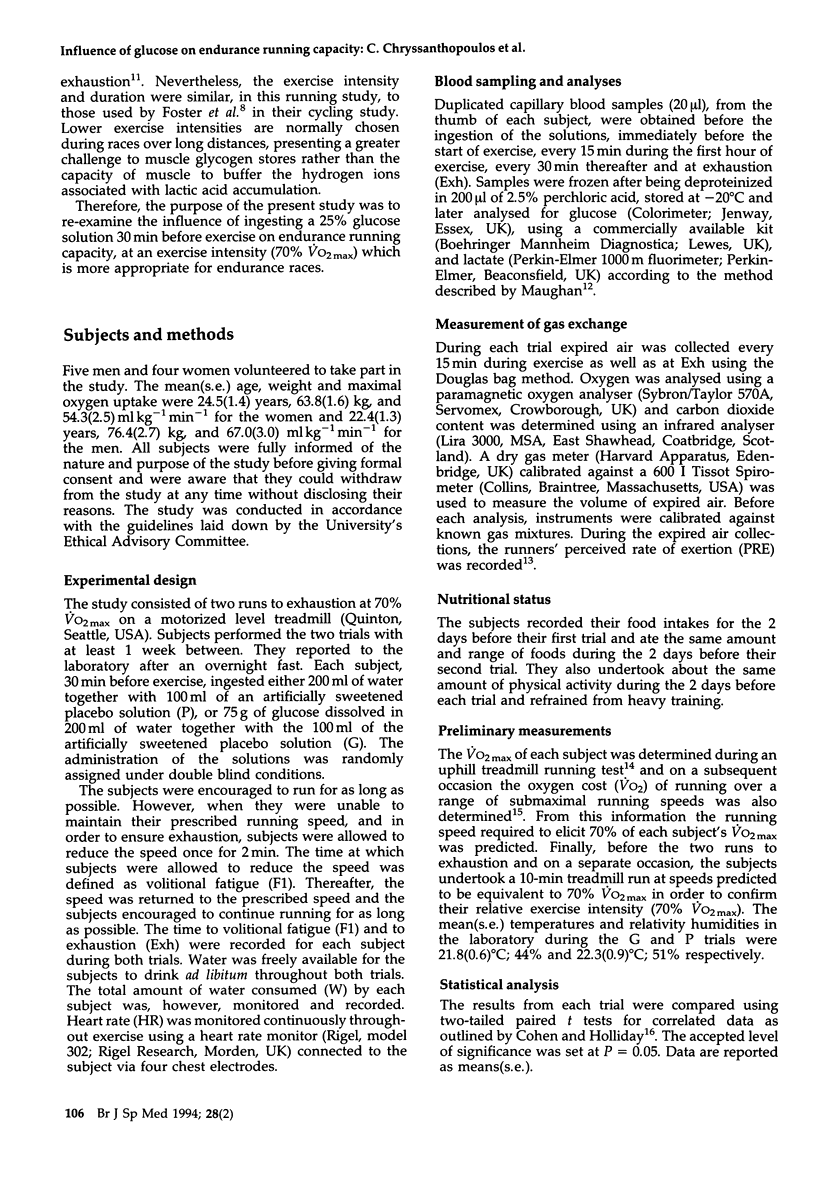
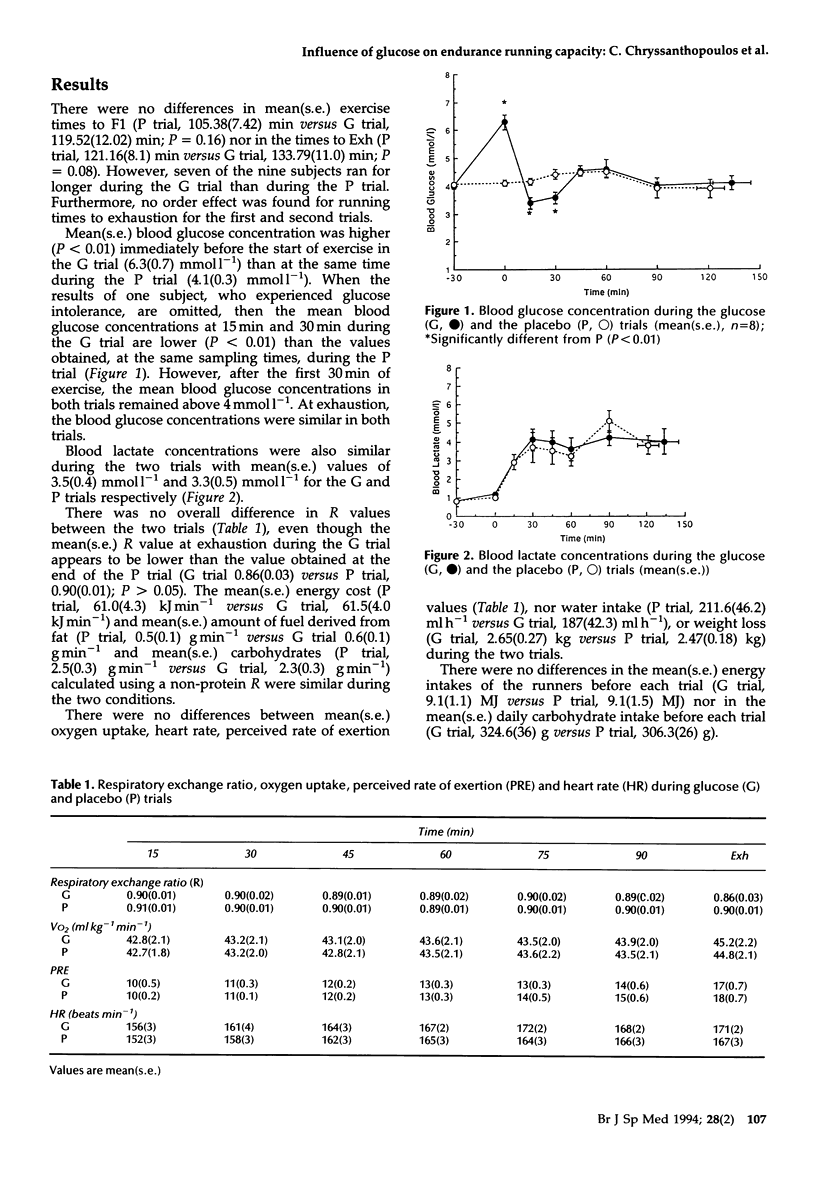
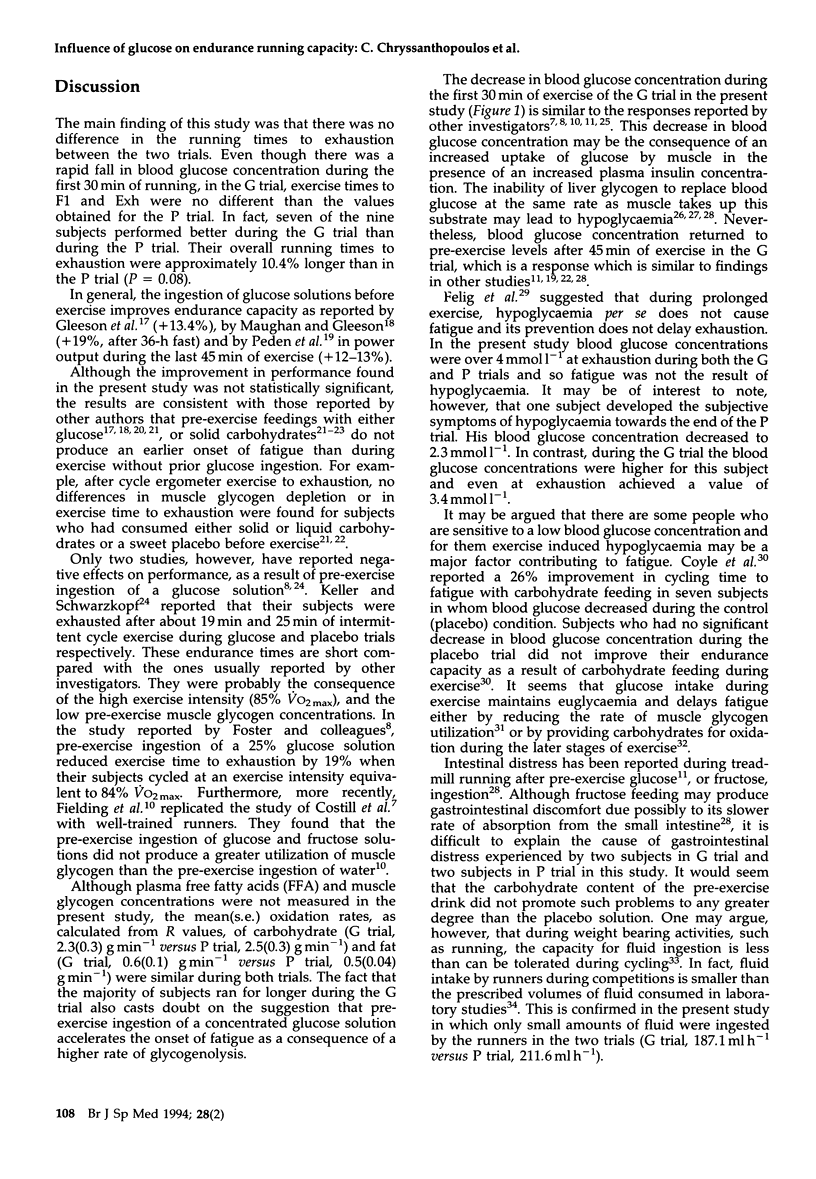
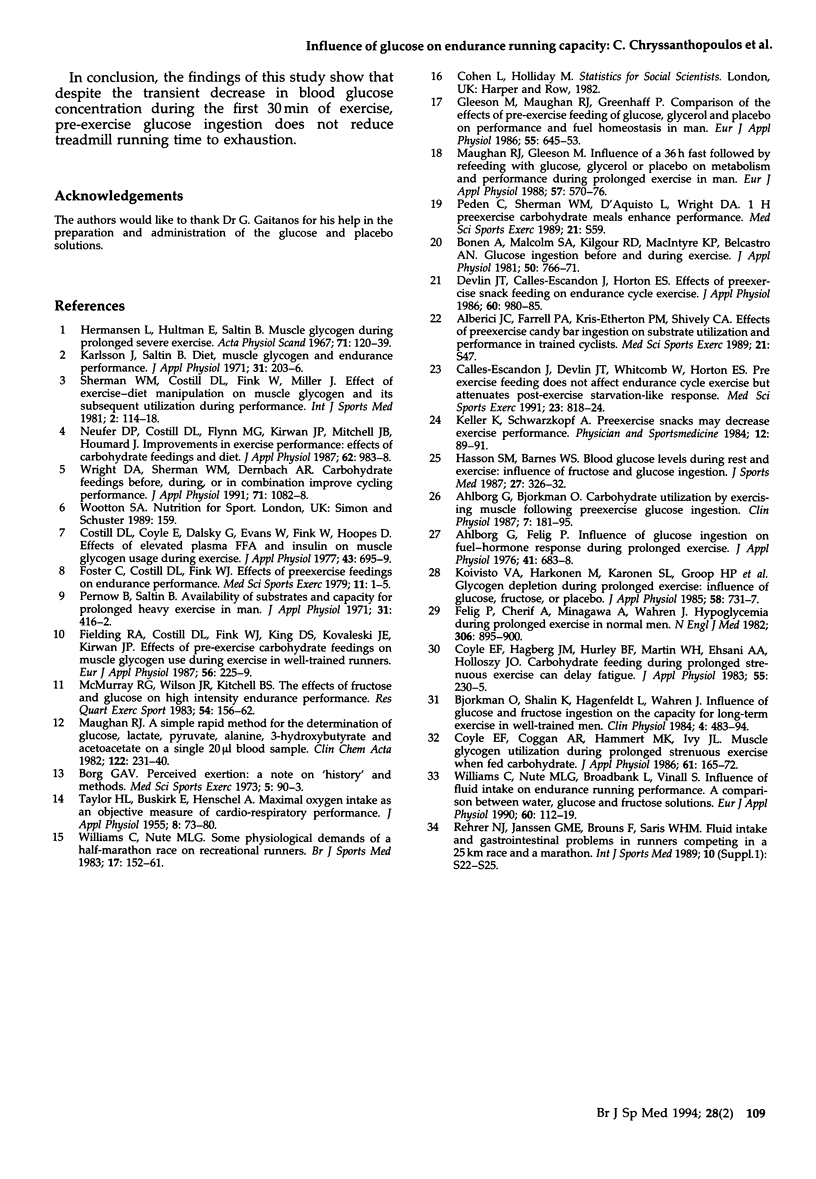
Selected References
These references are in PubMed. This may not be the complete list of references from this article.
- Ahlborg G., Björkman O. Carbohydrate utilization by exercising muscle following pre-exercise glucose ingestion. Clin Physiol. 1987 Jun;7(3):181–195. doi: 10.1111/j.1475-097x.1987.tb00160.x. [DOI] [PubMed] [Google Scholar]
- Ahlborg G., Felig P. Influence of glucose ingestion on fuel-hormone response during prolonged exercise. J Appl Physiol. 1976 Nov;41(5 Pt 1):683–688. doi: 10.1152/jappl.1976.41.5.683. [DOI] [PubMed] [Google Scholar]
- Björkman O., Sahlin K., Hagenfeldt L., Wahren J. Influence of glucose and fructose ingestion on the capacity for long-term exercise in well-trained men. Clin Physiol. 1984 Dec;4(6):483–494. doi: 10.1111/j.1475-097x.1984.tb00134.x. [DOI] [PubMed] [Google Scholar]
- Bonen A., Malcolm S. A., Kilgour R. D., MacIntyre K. P., Belcastro A. N. Glucose ingestion before and during intense exercise. J Appl Physiol Respir Environ Exerc Physiol. 1981 Apr;50(4):766–771. doi: 10.1152/jappl.1981.50.4.766. [DOI] [PubMed] [Google Scholar]
- Borg G. A. Perceived exertion: a note on "history" and methods. Med Sci Sports. 1973 Summer;5(2):90–93. [PubMed] [Google Scholar]
- Calles-Escandón J., Devlin J. T., Whitcomb W., Horton E. S. Pre-exercise feeding does not affect endurance cycle exercise but attenuates post-exercise starvation-like response. Med Sci Sports Exerc. 1991 Jul;23(7):818–824. [PubMed] [Google Scholar]
- Costill D. L., Coyle E., Dalsky G., Evans W., Fink W., Hoopes D. Effects of elevated plasma FFA and insulin on muscle glycogen usage during exercise. J Appl Physiol Respir Environ Exerc Physiol. 1977 Oct;43(4):695–699. doi: 10.1152/jappl.1977.43.4.695. [DOI] [PubMed] [Google Scholar]
- Coyle E. F., Coggan A. R., Hemmert M. K., Ivy J. L. Muscle glycogen utilization during prolonged strenuous exercise when fed carbohydrate. J Appl Physiol (1985) 1986 Jul;61(1):165–172. doi: 10.1152/jappl.1986.61.1.165. [DOI] [PubMed] [Google Scholar]
- Coyle E. F., Hagberg J. M., Hurley B. F., Martin W. H., Ehsani A. A., Holloszy J. O. Carbohydrate feeding during prolonged strenuous exercise can delay fatigue. J Appl Physiol Respir Environ Exerc Physiol. 1983 Jul;55(1 Pt 1):230–235. doi: 10.1152/jappl.1983.55.1.230. [DOI] [PubMed] [Google Scholar]
- Devlin J. T., Calles-Escandon J., Horton E. S. Effects of preexercise snack feeding on endurance cycle exercise. J Appl Physiol (1985) 1986 Mar;60(3):980–985. doi: 10.1152/jappl.1986.60.3.980. [DOI] [PubMed] [Google Scholar]
- Felig P., Cherif A., Minagawa A., Wahren J. Hypoglycemia during prolonged exercise in normal men. N Engl J Med. 1982 Apr 15;306(15):895–900. doi: 10.1056/NEJM198204153061503. [DOI] [PubMed] [Google Scholar]
- Fielding R. A., Costill D. L., Fink W. J., King D. S., Kovaleski J. E., Kirwan J. P. Effects of pre-exercise carbohydrate feedings on muscle glycogen use during exercise in well-trained runners. Eur J Appl Physiol Occup Physiol. 1987;56(2):225–229. doi: 10.1007/BF00640649. [DOI] [PubMed] [Google Scholar]
- Foster C., Costill D. L., Fink W. J. Effects of preexercise feedings on endurance performance. Med Sci Sports. 1979 Spring;11(1):1–5. [PubMed] [Google Scholar]
- Gleeson M., Maughan R. J., Greenhaff P. L. Comparison of the effects of pre-exercise feeding of glucose, glycerol and placebo on endurance and fuel homeostasis in man. Eur J Appl Physiol Occup Physiol. 1986;55(6):645–653. doi: 10.1007/BF00423211. [DOI] [PubMed] [Google Scholar]
- Hasson S. M., Barnes W. S. Blood glucose levels during rest and exercise: influence of fructose and glucose ingestion. J Sports Med Phys Fitness. 1987 Sep;27(3):326–332. [PubMed] [Google Scholar]
- Karlsson J., Saltin B. Diet, muscle glycogen, and endurance performance. J Appl Physiol. 1971 Aug;31(2):203–206. doi: 10.1152/jappl.1971.31.2.203. [DOI] [PubMed] [Google Scholar]
- Koivisto V. A., Härkönen M., Karonen S. L., Groop P. H., Elovainio R., Ferrannini E., Sacca L., Defronzo R. A. Glycogen depletion during prolonged exercise: influence of glucose, fructose, or placebo. J Appl Physiol (1985) 1985 Mar;58(3):731–737. doi: 10.1152/jappl.1985.58.3.731. [DOI] [PubMed] [Google Scholar]
- Maughan R. J. A simple, rapid method for the determination of glucose, lactate, pyruvate, alanine, 3-hydroxybutyrate and acetoacetate on a single 20-mul blood sample. Clin Chim Acta. 1982 Jul 1;122(2):231–240. doi: 10.1016/0009-8981(82)90282-0. [DOI] [PubMed] [Google Scholar]
- Maughan R. J., Gleeson M. Influence of a 36 h fast followed by refeeding with glucose, glycerol or placebo on metabolism and performance during prolonged exercise in man. Eur J Appl Physiol Occup Physiol. 1988;57(5):570–576. doi: 10.1007/BF00418464. [DOI] [PubMed] [Google Scholar]
- Neufer P. D., Costill D. L., Flynn M. G., Kirwan J. P., Mitchell J. B., Houmard J. Improvements in exercise performance: effects of carbohydrate feedings and diet. J Appl Physiol (1985) 1987 Mar;62(3):983–988. doi: 10.1152/jappl.1987.62.3.983. [DOI] [PubMed] [Google Scholar]
- Pernow B., Saltin B. Availability of substrates and capacity for prolonged heavy exercise in man. J Appl Physiol. 1971 Sep;31(3):416–422. doi: 10.1152/jappl.1971.31.3.416. [DOI] [PubMed] [Google Scholar]
- Rehrer N. J., Janssen G. M., Brouns F., Saris W. H. Fluid intake and gastrointestinal problems in runners competing in a 25-km race and a marathon. Int J Sports Med. 1989 May;10 (Suppl 1):S22–S25. doi: 10.1055/s-2007-1024950. [DOI] [PubMed] [Google Scholar]
- Sherman W. M., Costill D. L., Fink W. J., Miller J. M. Effect of exercise-diet manipulation on muscle glycogen and its subsequent utilization during performance. Int J Sports Med. 1981 May;2(2):114–118. doi: 10.1055/s-2008-1034594. [DOI] [PubMed] [Google Scholar]
- TAYLOR H. L., BUSKIRK E., HENSCHEL A. Maximal oxygen intake as an objective measure of cardio-respiratory performance. J Appl Physiol. 1955 Jul;8(1):73–80. doi: 10.1152/jappl.1955.8.1.73. [DOI] [PubMed] [Google Scholar]
- Williams C., Nute M. G., Broadbank L., Vinall S. Influence of fluid intake on endurance running performance. A comparison between water, glucose and fructose solutions. Eur J Appl Physiol Occup Physiol. 1990;60(2):112–119. doi: 10.1007/BF00846030. [DOI] [PubMed] [Google Scholar]
- Williams C., Nute M. L. Some physiological demands of a half-marathon race on recreational runners. Br J Sports Med. 1983 Sep;17(3):152–161. doi: 10.1136/bjsm.17.3.152. [DOI] [PMC free article] [PubMed] [Google Scholar]
- Wright D. A., Sherman W. M., Dernbach A. R. Carbohydrate feedings before, during, or in combination improve cycling endurance performance. J Appl Physiol (1985) 1991 Sep;71(3):1082–1088. doi: 10.1152/jappl.1991.71.3.1082. [DOI] [PubMed] [Google Scholar]


